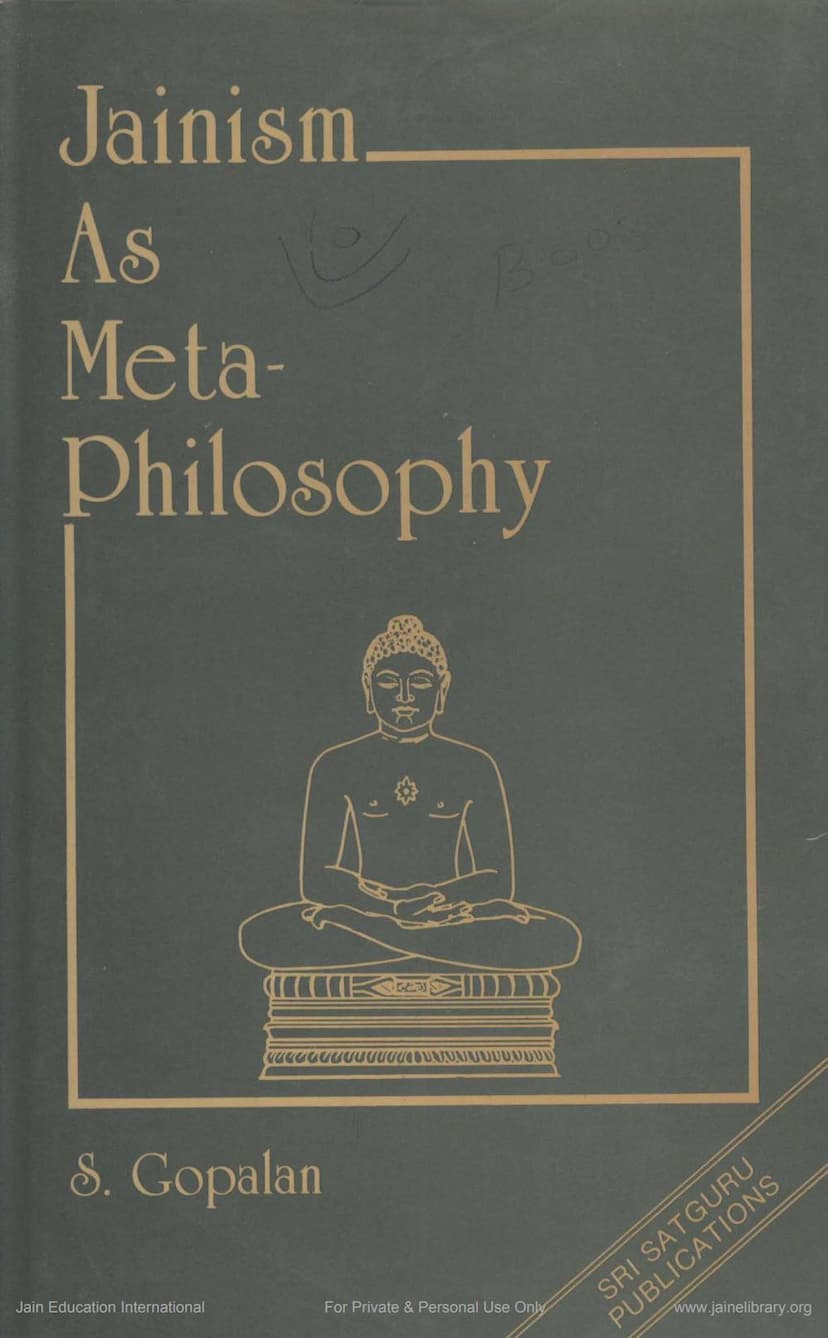Jainism As Metaphilosophy
Added to library: September 2, 2025

Summary
Here's a comprehensive summary of S. Gopalan's "Jainism as Metaphilosophy," based on the provided text:
Core Argument and Aim:
The central aim of S. Gopalan's "Jainism as Metaphilosophy" is to reveal the philosophical depth of the Jaina tradition by analyzing its core concepts through the lens of contemporary metaphilosophy. The author argues that despite common misunderstandings, particularly regarding Anekāntavāda, Nayavāda, and Syādvāda, a rigorous examination of these Jaina doctrines demonstrates that Jainism offers a sophisticated and constructive-critical approach to philosophy itself. In essence, Jainism not only presents its own philosophical system but also offers a "philosophy of philosophy" – a metaphilosophy.
Metaphilosophy and the Jaina Contribution:
Gopalan defines metaphilosophy as "philosophising about philosophy" or "a philosophy of philosophy." It involves asking fundamental questions about the nature, scope, subject matter, and methods of philosophy. He posits that Jainism, by focusing on how to do philosophy and critically evaluating different philosophical systems and their methods, functions as a metaphilosophy. This is achieved through its core doctrines, particularly Anekāntavāda, Nayavāda, and Syādvāda.
Key Themes and Concepts:
-
The Nature of Philosophy: Gopalan begins by highlighting the diverse and often contested definitions of philosophy in the Western tradition. He contrasts this with the Indian understanding of philosophy as darśana (literally "seeing"), which encompasses perception, inference, and intuition. The term darśana itself signifies a holistic approach to knowledge and reality.
-
Jainism's Place in Indian Thought: The author emphasizes that Jainism is not an entirely independent stream but an integral part of the broader Indian philosophical landscape. He notes the historical interconnectedness of early Indian traditions (Hinduism, Jainism, Buddhism) and the need to understand them within a shared proto-Indian context.
-
The Jaina Weltanschauung: The book delves into the Jaina understanding of Reality (sat), which encompasses both the conscious (jiva) and non-conscious (ajiva) aspects. Reality is understood as Substance (dravya), characterized by origination (utpāda), decay (vyaya), and permanence (dhruvatva). This realistic and comprehensive view of existence forms the bedrock of their philosophical inquiry.
-
Philosophy as Criticism: A central thesis is that Jainism embodies philosophy as a critical discipline. This criticism is not destructive but constructive, aiming to refine understanding rather than simply refute opposing views. This critical function is primarily articulated through:
- Anekāntavāda (Doctrine of Manifoldness): This doctrine posits that Reality is inherently complex and multifaceted. This complexity is the justification for the existence of multiple, often divergent, philosophical perspectives. Anekāntavāda advocates for a non-one-sided approach to understanding Reality, countering absolute or exclusive claims made by various philosophical schools. It encourages an analytical process to uncover these diverse facets.
- Nayavāda (Doctrine of Standpoints/Perspectives): This doctrine provides the framework for analyzing the manifold nature of Reality by identifying different "standpoints" or perspectives (naya) from which Reality can be viewed. Gopalan highlights how Nayavāda, by cataloging various nayas (like the substance viewpoint and the modal viewpoint), implicitly criticizes philosophical systems that exclusively adhere to a single perspective, leading to a distorted or incomplete understanding. It underscores the need for analytical criticism of extreme positions.
- Syādvāda (Doctrine of Conditional Predication): Syādvāda, presented as the synthetic complement to Nayavāda's analysis, offers a method for reconciling these diverse perspectives. It achieves this by prefixing the qualifier "Syāt" (May be) to every proposition about Reality. This conditional predication acknowledges the partial truth of each viewpoint without granting it absolute validity. Syādvāda acts as a criticism of absolutistic claims, promoting a synthesis of various insights through a process of careful, qualified acceptance and rejection. It emphasizes that truth is relational and context-dependent.
-
Methodology and Purpose: The Jaina approach to philosophy emphasizes the crucial role of methodology. The doctrines of pramāṇa (means of knowledge) highlight the importance of perception, inference, and ultimately, intuitive experience (kevala-jñāna or omniscience). However, the Jaina thinkers also acknowledge the limitations of reason and the senses, suggesting that the ultimate comprehension of Reality transcends purely intellectual or empirical means. The ultimate purpose of philosophizing is not just intellectual satisfaction but the transformation of human life towards liberation.
Contribution to Metaphilosophy:
Gopalan argues that Jainism's metaphilosophical contribution lies in its systematic articulation of a constructive-critical approach to philosophy. By recognizing the inherent complexity of Reality and advocating for the integration of diverse perspectives through analysis and synthesis, Jainism provides a model for how philosophical inquiry should proceed. It critiques philosophies that fall into absolutism or one-sidedness, promoting instead an open-minded, balanced, and ultimately more comprehensive understanding of the subject matter of philosophy.
In essence, the book positions Jainism as a tradition that offers profound insights into the very nature and practice of philosophy itself, urging a critical yet creative engagement with different schools of thought to arrive at a more holistic grasp of truth.